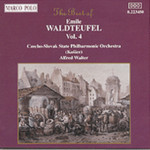
The Best of Vol 4 (Incls 'Zig-zag polka' & 'Solitude Waltz')
 $17.99
Out of Stock
$17.99
Out of Stock2-4 weeks add to cart
WALDTEUFEL
The Best of Vol 4 (Incls 'Zig-zag polka' & 'Solitude Waltz')
Czecho-Slovak Radio Symphony Orchestra, Alfred Walter
[ Marco Polo / CD ]
Release Date: Wednesday 1 July 2009
This item is currently out of stock. We expect to be able to supply it to you within 2 - 4 weeks from when you place your order.
Emile Waldteufel was born in Strasbourg on 9 December 1837, just seven weeks after the elder Johann Strauss gave his first concert on French soil in that very city.
Like Johann Strauss, Emile Waldteufel came from a family of dance musicians, being preceded in the business by his father Louis (1801-84) and brother Léon (1832-84). Despite their Germanic surname, the family were French. This is explained by the fact that they hailed from Alsace, which despite strong German traditions had been fully integrated into France since 1793.
Emile Waldteufel was born in Strasbourg on 9 December 1837, just seven weeks after the elder Johann Strauss gave his first concert on French soil in that very city. When he was seven the family moved to Paris for Léon to take up a place as a violin student at the Paris Conservatoire. Emile Waldteufel was to live in Paris for the rest of his life, and he in turn studied piano at the Conservatoire from 1853 to 1857, his classmates there including Jules Massenet.
Meanwhile the family dance orchestra was becoming one of the best-known in Paris, increasingly in demand for Society balls during Napoleon III's Second Empire. In 1865 Emile was appointed court pianist to the Empress Eugénie in succession to Joseph Ascher (composer of 'Alice, where art thou?'), performing at Court functions not only in Paris but in Biarritz and Compiègne. From 1867 the Waldteufel orchestra played at Napoleon III's magnificent Court balls at the Tuileries.
After the Franco-Prussian War the orchestra again presided at the Presidential balls at the Élysée. Yet so far Emile Waldteufel's dances had been known only to a relatively limited Society audience. By the time international fame came he was almost forty. In 1874 he happened to be playing at a soirée attended by the Prince of Wales, the future Edward VII. The Prince complimented him on his waltz Manolo and agreed to help launch his music in London.
The result was a long-term publishing contract with the London firm of Hopwood & Crew. Since the firm was half-owned by Charles Coote, director of Coote & Tinney's Band, the premier London dance orchestra, this also gave access to the musical programmes of Queen Victoria's State Balls at Buckingham Palace. For several years Emile Waldteufel's music dominated the programmes there, generating him world-wide fame as he turned out a string of works that enjoyed huge popularity - including his best-known work Les Patineurs ('The Skaters') in 1882.
His French publisher Durand, Schoenewerk was now forced to buy the French rights to these works from Hopwood & Crew. So later did the German firm of Litolff, in whose editions the works sometimes appeared under slightly different German names. In addition, to suit Germanic custom, in 1883 Litolff retrospectively began an opus numbering system. This began at 101 to make arbitrary allowance for early works, and for various reasons many works were numbered out of chronological sequence, thereby providing a source of much confusion ever since.
In 1890 and 1891 Waldteufel conducted at the Paris Opéra Balls, and his orchestra continued to provide dance music for Presidential Balls, as well as for other Society functions, until 1899, when he retired. He continued to compose, but in a style that was already outdated. He died in Paris on 12 February 1915 at the age of 77. His wife, a former singer Célestine Dufau, whom he married in 1871 and by whom he had two sons and a daughter, had died the previous year.
Tracks:
Zig-zag, Polka, Op. 248
Les Fleurs, Waltz, Op. 190
Par - ci, par - la, Polka, Op. 239
Solitude, Waltz, Op. 174
Fleurs et baisers, Waltz
Toujours fidele, Waltz, Op. 169
L'Esprit francais, Polka, Op. 182
Toujours ou jamais, Waltz, Op. 156
Hebe, Waltz, Op. 228
![Concerti a quattro violini [concertos for four violins] cover](https://images.marbecks.co.nz/_thumbnails/10166/10166179.jpg)


